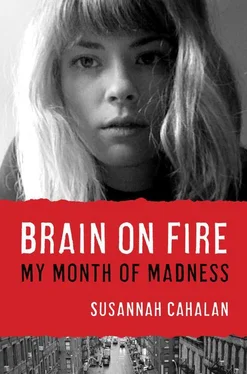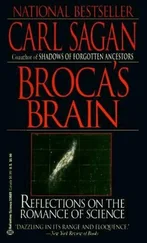“I’m still suing that guy!”
The doctor nodded patiently and departed to address the gunshot wounds and drug overdoses that awaited him.
“I have to call your mom,” Stephen said.
“You don’t have to do that,” I insisted, my voice mellowing as I returned, almost instantly, to my old self. Manic episodes can fade away as quickly as they arise. “I don’t want her to worry.” Mom was a worrier by nature, and I had tried to spare her the full story of what was happening to me so far.
“I have to,” he insisted and coaxed her home number out of me. He stepped into the hallway and waited two interminably long rings before Allen, my stepfather, picked up the phone.
“Hello,” he said groggily in his thick Bronx accent.
“Allen, it’s Stephen. I’m at the hospital. Susannah had a seizure, but she’s doing fine.”
In the background, my mom shouted, “Allen, what is it?”
“She’s going to be okay. They’re discharging her,” Stephen continued.
Despite my mom’s rising panic, Allen maintained his composure, telling Stephen to go back home and sleep. They would come in the morning. When he hung up the phone, my mom and Allen looked at each other. It was Friday the Thirteenth.
My mom felt the foreboding, and she began to cry uncontrollably, certain that something was seriously wrong. It was the first and last time she would allow herself to completely succumb to her emotions in the frightening months that followed.
First thing the next morning, while Allen scouted the street for parking, my mom arrived at my apartment door looking sharp, as always. Her frenetic energy, however, was palpable. She was terrified of even hearing about cancer on the radio, and now she had to cope with her own daughter’s mysterious seizure. I watched from the bed as she wrung her beautifully shaped hands, the feature I most adored about her, lobbing question after question at Stephen about the night in the hospital.
“Did they give any explanation? What kind of doctor saw her? Did they do an MRI?”
Allen came around behind her and massaged her earlobe, a habit of his to calm people he loves. She unwound the instant he touched her. Allen is her third husband, after my dad: her first husband was an architect, and the marriage didn’t work for a number of reasons, in part because my mom, very much a feminist of the 1970s, didn’t want children. She wanted to focus instead on her career at Manhattan’s district attorney’s office, where she still worked. When she met my father, she left her first husband and together they had my brother, James, and me. Despite having had kids together, their relationship was ill fated from the start. Both were as hot-tempered as they were stubborn, yet they managed to make their marriage last nearly two decades before they divorced.
My mom and Allen had met thirty years ago at the district attorney’s office, long before she married my dad. Allen had won her over as a friend with his loyalty and devotion. He eventually became her key confidant in and out of the DA’s office and through her divorce with my father. Allen’s brother was schizophrenic, and as a result Allen had turned inward, maintaining only a few important friendships and living primarily in his own world. He was animated with his closest loved ones, gesticulating wildly with his hands and laughing a contagious guffaw; with outsiders, he could be quiet and aloof, to the point of seeming rude. But his warmth and calm, not to mention his experience with mental illness, would prove invaluable over the coming weeks.
Before my seizure, he and my mom had developed a theory culled from the few things that they knew about my month of strange behavior. They suspected I was having a nervous breakdown, prompted by stress at work and the responsibilities of living on my own. The seizure didn’t fit into that scenario, though, and now they were even more concerned. After some debate, they decided it would be safest for me to come home with them to Summit, New Jersey, where they could look after me.
Stephen, my mom, and Allen used various tactics to try to get me out of bed, but I refused to budge. To me, the most important thing was to stay in my own apartment, no matter what: going back to my parents’ house would make me feel like a child. As badly as I needed it, help was the last thing I wanted. Somehow, though, their combined forces managed to get me out of my house and into the Subaru.
. . .
Summit, named one of the best places to live in America by Money magazine, is an affluent suburb twenty miles from Manhattan, a haven for WASPs and Wall Street bankers who congregate at the many country clubs within its six square miles. 9We’d moved there in 1996 from Brooklyn, but even though it had been an ideal place to grow up, our family had never exactly fit in. In a neighborhood of white houses, my mom had chosen to paint our house a lavender-gray-purple, which prompted one of my sixth-grade classmates to comment: “My mom says that you’re going to get polka dots too!” Eventually my mom changed the color to a less outrageous blue-gray.
Instead of relaxing into the nostalgia of being back in my childhood home, though, as I settled into the Summit house over the next few days I began to cling even more vehemently to the Manhattan life I’d left behind. On Sunday afternoon I became obsessed with filing an overdue article on a fairly simple story about a troupe of dancers that was opening off-Broadway who called themselves “Gimp,” made up of disabled performers.
“They’re not your typical dancers,” I began. Unhappy with the line, I erased it. For the next half hour, I wrote, erased, and rewrote that same sentence until I gave up and began to pace, trying to wrestle myself out of writer’s block. I wandered into the family room, where Mom and Allen were watching TV, desperate to tell them about my new trouble with words. But when I got there, I could no longer remember why I’d come.
The TV blasted the theme song to their favorite show, the medical drama House. Seconds later, the normally muted green of the couch grew noxiously garish.
Then the room seemed to pulsate and breathe, like the office hallway.
I heard my mom’s voice, shrill and far away: “Susannah, Susannah. Can you hear me?”
Next thing I knew, my mom was sitting beside me on the couch, rubbing my feet, which had stiffened up in a painful charley horse. I looked up at her helplessly. She said, “I don’t know what happened. It was like you were in a trance.”
My mom and Allen exchanged worried glances and phoned Dr. Bailey to see if they could schedule an emergency appointment. The earliest he could do it, he said, was Monday.
I spent the weekend in Summit, ignoring calls from concerned coworkers and friends. I was too embarrassed by my own unexplainable behavior to talk to them and so consumed by the strange stirring in my mind that I turned away from those closest to me, which normally I would never have done. For some reason, I did pick up the phone once, when I saw it was my friend Julie, a Post photographer and the most carefree, lighthearted person I know. As soon as we started talking, I began to tell her everything: the seizures, the strange thoughts, the visions. Maybe it was because I knew her mother was a shrink. When I finished, it turned out that she had already spoken to her mother about me.
“She thinks it’s possible that you’re having a manic episode and that maybe you have bipolar disorder. Whatever it is, you should see a psychiatrist,” she suggested.
Читать дальше













